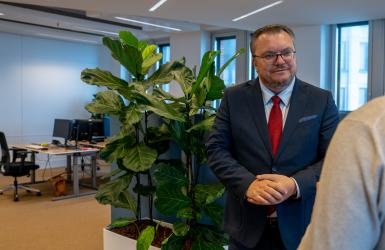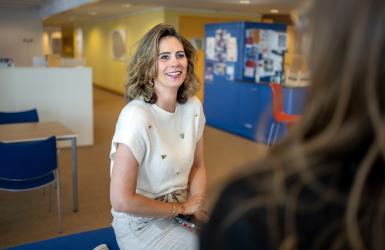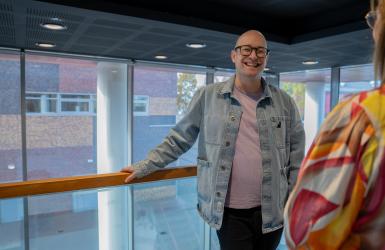The story of Diederick, corporate lawyer
‘We are the legal conscience of the IND’ Anyone who thinks the IND begins and ends with decision-making staff members is only seeing half…
Each applicant is a person like you and me. A person with dreams.
The Title and Identity Team makes sure that an applicant is always registered correctly in the IND systems, including the correct right of residence, removability grounds and identity. In addition, the team is responsible for detecting and correcting incorrect personal and other data in INDiGO, the system managing the registration.
Right of residence and removability grounds? Those are fancy words, but what do they really mean? Thamara explains: ‘Rights of residence indicate an applicant’s status. And whether someone is allowed to stay in the Netherlands legally. Removability grounds demonstrate the extent to which someone is not or no longer allowed to stay here. These data are shared with other organisations, such as town halls, the Tax and Customs Administration, the COA and the Aliens Police. So, accurate records are incredibly important for this. Because only with the correct right of residence is someone allowed to work in the Netherlands or eligible for benefits.’
As a quality assurance assistant, Thamara is jointly responsible for the accuracy of these data. She says: ‘Sometimes I make sure that a person is alerted in the system so that the aliens police can act accordingly. At other times, I make sure that a residence permit is entered into the system correctly so that an applicant will have the correct rights and duties as a result. This doesn’t make a difference for me. My principle is always: the system must be correct. I am strongly committed to this quality and accuracy.’
What does this mean in practice? ‘Let me give an example. Imagine someone with a residence permit wants to take out health insurance, but is refused. The applicant then calls the IND to ask what’s wrong. After all, you can only take out health insurance if you are staying legally in the Netherlands. An IND official then detects that the applicant’s rights are not correct in the system. This information then reaches our team and we investigate what’s wrong. Sometimes, it is only a registration error, which we then correct. Sometimes the right of residence has changed indeed, and the system is correct. The applicant must then take other steps to reobtain the correct right of residence.’
With her 25 years of IND work experience, Thamara has almost become part of the furniture. Still, she has not been bored for a single day. ‘In the past, I always thought I wasn’t cut out for a desk job. But I really do like figuring out how work processes function and contributing to improvement. I’m a bouncing ball and have ended up in many corners of the IND over the years. From team support assistant to team assistant, and from complaint processing staff to administrative staff: I’ve worked at many places. But for the past 17 years, the ball has been relatively stable in one place: at the Title and Identity Team.’
A great achievement. And special at the same time. Because 25 years at the same organisation – that is not something we hear a lot these days. Why is Thamara in the right place? ‘This has several reasons. Above all, I’m attached to this sector. Each applicant is a person like you and me. And all people have dreams. All our applicants have come to the Netherlands with a dream for which they’ve left behind their birth country. Whether it is for love, war or work – that doesn’t matter in the end. They believed in something and have ended up here. Those are the people for whom I do my job. And I want to do it well for them.’
Thamara continues: ‘Add to this that I really like the IND as an organisation to work for. We have 5,000 people working here, all with their own personality and character traits. So, it is important that everyone feels accepted and safe. And that’s certainly how I’ve experienced it in all these years. Moreover, I’ve got freedom here and that keeps me going.’
Freedom in an organisation under great social pressure? How does that work? Thamara continues: ‘Of course I have my duties. When I’m talking about freedom, I do not mean working hours or work pressure. I mean the freedom of how I carry out my work and what balance works for me personally. Working from home, for example. That’s something I love and it is something I’m allowed to do here. In addition, there is attention for my personal development: here, I’m allowed to discover and develop my talents. Sometimes I look at other organisations or other countries and think: I’ve got good reason to be happy.’
Do you want to find out more about rights and codes of residence? Then also read the background article Rights of residence and code 98

‘We are the legal conscience of the IND’ Anyone who thinks the IND begins and ends with decision-making staff members is only seeing half…

'Healthy and happy staff' When Evelien joined the IND in 2016, she only planned to spend two years here to gain experience.…

‘A single conversation can change someone’s day, week, or even their life’ Anyone who contacts the IND with questions about an application, a residence permit, or…